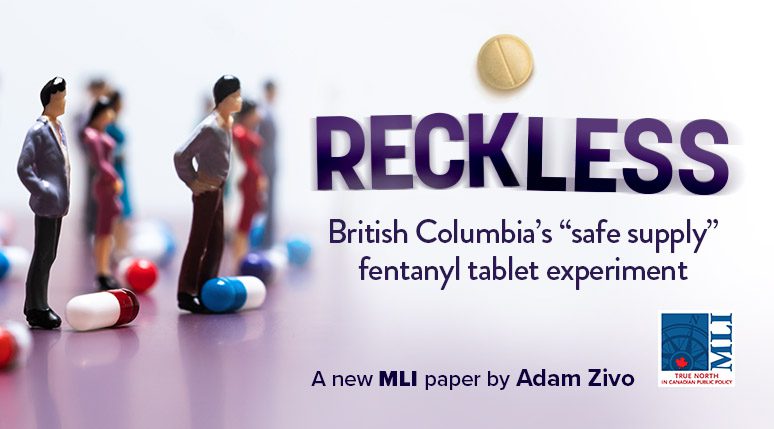OTTAWA, ON (December 14, 2023): British Columbia’s new drug protocols allow doctors throughout the province to prescribe “safer supply” drugs in a reckless manner.
In a new report titled Reckless: British Columbia’s “safe supply” fentanyl tablet experiment, Adam Zivo reviews the newest drug protocols adopted by the BC government, documenting the evolution of “safe supply” opioid programs in Canada since 2020. Zivo reports on the concerning lack of evidence behind the protocols, how they undermine recovery, drive diversion to the black market, and ruin the lives of young Canadians.
The new protocols not only avoid any requirement for drug users to first try evidence-based recovery programs before receiving high-potency opioids, but also allow minors to receive them, with no reference to the rights and roles of parents or even a minimum age for safer supply clients.
Of deep concern is also the BC government’s approach of continually increasing access to “safe” opioids despite openly admitting that there is no evidence of proven benefits or safety. The protocols also require that clients be told that their access to free fentanyl and sufentanil will almost certainly be cut off if they are hospitalized, or if they attend withdrawal management or substance use treatment facilities.
Zivo explains: “The prospect of free fentanyl and sufentanil creates powerful incentives to sign away one’s rights to evidence based treatment, so the province is essentially exploiting clients’ addictions so that it can experiment on them without taking legal responsibility for potential harms.”
Zivo adds that “one can reasonably expect that a significant portion of the fentanyl tablets being distributed by the BC government will end up being traded or resold on the black market,” explaining how mass diversion is already a major issue for weaker “safer supply” opioids like hydromorphone.
While addiction experts have been overwhelmingly critical of unsupervised safer supply, Zivo notes that many believe that the solution is not to abolish but to reform the program so that drugs can be provided more responsibly. By receiving safer supply as a temporary intervention, addicted users can transition to recovery-oriented treatments such as opioid agonist therapy (OAT.)
“It would not take much to reshape BC’s safer supply fentanyl and sufentanil programs into something more responsible and genuinely safe,” concludes Zivo. “There is nothing preventing the province from redesigning safer supply as a recovery-oriented intervention.”
To learn more, read the full paper here:
Adam Zivo is a freelance writer and political analyst best known for his weekly columns in the National Post. He holds a Master of Public Policy from the Munk School of Global Affairs and Public Policy and recently founded the Centre for Responsible Drug Policy, a nonprofit advocacy organization.
For further information, media are invited to contact:
Skander Belouizdad
Communications Officer
613-482-8327 x111







